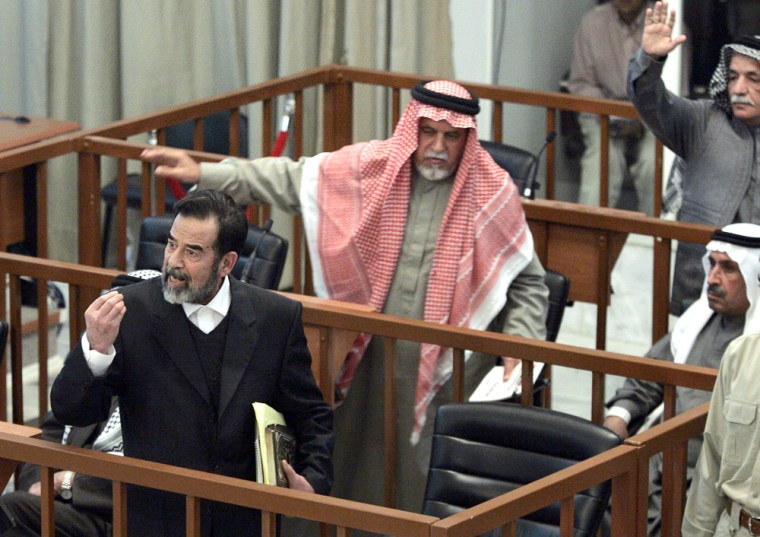All rise as three judges, cloaked in black robes with a white fringe, take their seats behind a wooden bench facing prosecutors, defense lawyers and the accused, standing unshackled in a metal cage.
It's a scene that some American soldiers and contractors may someday face under a draft new security agreement, which gives Iraqis first crack at prosecuting them for "premeditated and gross felonies" committed off base and off duty.
Americans charged with such offenses would face proceedings where there's no jury, rules of evidence are a work in progress and the judges often render verdicts and impose sentences in the same session.
Critics complain the system is overwhelmed by thousands of cases, inexperienced judges and corruption — much of it petty payoffs to clerks to make sure the defendants get a speedy court date.
During a recent hearing in a sprawling, tan-colored court complex that opened last year, a harried woman stenographer scribbled notes by hand as the chief judge summarized a witness' testimony. Her notes — and not a word-for-word transcript — form the record of the trial.
The session was postponed after a few minutes because the defense lawyers complained they didn't have time to read the case file. To do that, they must come to the court complex in eastern Baghdad and negotiate a web of checkpoints and blast walls to see the evidence.
The legal system, based on continental European and Arab models, is basically the same that operated through Saddam Hussein's rule, although Iraqi judges and lawyers insist it is no longer subject to the same level of government interference.
"The problem in the Iraqi courts is that it has a certain level of integrity but this integrity is not absolute," said lawyer Rabia Ibrahim.
Legal defense 'sacred'
On paper, the judicial system guarantees the rights of the accused and is independent of outside interference. The Iraqi constitution states that the right to a legal defense is "sacred and guaranteed."
Instead of a jury, three judges decide whether the accused committed the crime and impose the sentence — usually in the same session as they announce the verdict.
Trials are aimed at uncovering the truth, and the judges' instincts count nearly as much as the legal arguments presented by both sides.
Judges, and not the lawyers, ask the witnesses and defendants most of the questions and are not bound by the same restrictions of rules of evidence and precedents as their counterparts in the United States.
That places a huge responsibility on the judges, many of whom lack training and experience because they joined the bench only after the fall of Saddam's regime in 2003.
"The main problem in the Iraqi court system is that there are very, very young judges and very, very old judges," said Ammar Hashim, who has practiced law for 16 years. "The younger judges were lawyers who did not take the proper courses but were appointed judges by passing a simple test."
He said young judges often delay proceedings because they are unfamiliar with the fine points of the law and "the older judges are too senile to understand any case."
Hashim insisted the Iraqi court system was "the most unbiased court in the Middle East."
Did al-Maliki change judges in Saddam trial?
Last month, however, a group of Western lawyers who advised the Iraqi judiciary alleged that Prime Minister Nouri al-Maliki forced the resignation of one of the five judges trying Saddam only days before the verdict that sent him to the gallows.
PBS and The New York Times quoted the lawyers as saying the judge was replaced by another jurist from al-Maliki's party, possibly because the government worried that the panel would not sentence Saddam to death.
The government says the judge was transferred to another court at his own request and was replaced by another who had served as a backup jurist.
When someone in Iraq is accused of a crime, the case goes to an investigative judge, whose job corresponds roughly to a grand jury in the United States.
The investigative judge can hold hearings, question witnesses and defendants, subpoena documents, determine whether evidence is relevant and even assign new investigators to look into the case.
Pretrial investigative hearings can appear chaotic by American standards. Clerks wander in with documents for the judge to sign. Mobile phone calls sometimes interrupt the judge, forcing witnesses to repeat their testimony, which the judge then summarizes for the stenographer.
Defense attorneys are free to raise objections or challenge the investigative judge. But they risk offending the judge, who wields considerable power in determining what evidence will be presented later at the trial.
Once the investigative judge compiles his finding, he forwards the case to a judicial panel that reviews the material and if necessary selects three judges to preside over a trial.
Trials often move quickly, in part because the judges rely heavily on the findings of the investigative judge.
During the trial, the three judges question witnesses and are free to amend the charges — a power that sometimes leaves defense attorneys scrambling to switch gears in the middle of the proceedings.
The judges render a verdict by majority vote and impose sentence. Defendants have the right to appeal and if the sentence is death, the decision must be reviewed by the Iraqi president and his vice presidents.
"The Iraqi judiciary is able of handing down fair verdicts against American soldiers," Hashim said. "Iraqi law is coherent and enough to judge American soldiers.
